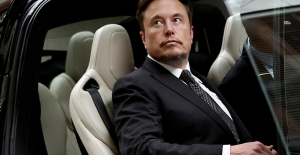In the meantime, even experts have lost track of how often the launch of the most powerful Nasa rocket has been postponed since the Space Shuttle flights. The SLS rocket (Space Launch System) was originally supposed to take off at the end of 2016, but the launch site has remained cold at least a dozen times since then. When around 25,000 spectators came to the spaceport in Cape Canaveral in Florida on Monday to finally witness the launch of the 98 meter high rocket, everything should work out. However, anticipation turned to disappointment.
The launch of the "Artemis 1" mission had to be called off 40 minutes before the ignition was canceled due to problems with one of the four core engines. "It's a very complicated machine," said 79-year-old NASA CEO Bill Nelson. As an ex-Space Shuttle astronaut, he himself has experienced four times that his flight has been postponed. So it's better to be on the safe side. Next Friday, September 2nd, NASA is expected to try again to launch the unmanned mission.
It is the first test flight of the SLS rocket towards the moon, a first landing is planned for 2025 or 2026 - a good 50 years after the last visit by US astronauts to the moon. Later, NASA wants to dare flights to Mars using SLS technology. The first mission of the new Orion space capsule is now scheduled to last 43 days. To be on the safe side, only dolls will be inside during the first flight. Only when she returns safely to earth would it be the successful start of a new era in space travel. This includes the colonization of the moon and its permanent orbit by an only occasionally manned space station, the so-called gateway.
The US space agency Nasa is investing incredible sums for this. The United States wants to develop its own state heavy-duty rocket, even if private-sector offers, for example from billionaire Elon Musk with his space company SpaceX, or perhaps from Amazon founder Jeff Bezos and his Blue Origin project, would be cheaper.
The return to the moon will have to wait a little longer. The launch of the Artemis mission has been canceled by NASA. The reason is technical problems with one of the rocket engines.
Source: WORLD
The launches of the first four SLS rockets in the Artemis project each cost an incredible 4.1 billion dollars, it was announced at the end of 2021. Although Nasa is apparently getting a new rocket for the extreme price, older technology is used in parts. The four core engines were already used in the space shuttle, and Nasa procured the supply module for the capsule from the European Airbus in Bremen.
The problem from Nasa's point of view is the contract design: the long-established manufacturers of the rocket, mainly Boeing and Lockheed Martin for the capsule, have no real incentive to push the project forward cheaply and efficiently. You will be reimbursed for the development and construction costs plus profit mark-up. These so-called cost-plus contracts lead to exorbitant prices. According to a report, the Artemis program will cost NASA around 93 billion dollars between 2012 and 2025. In the meantime, NASA is examining whether it shouldn't be better to agree on fixed prices in the future.
In addition, the Artemis project with the SLS rocket builds on the old disposable concept: the rocket is – apart from the capsule – not reusable. The rocket stages fall into the sea after launch. Every new building costs. Musk's recycling rockets show how it can be done better. His company SpaceX is about to embark on the maiden flight of the Starship monster rocket, complete with its “Super Heavy” booster. The combination is not only larger and more powerful than the SLS rocket, but also reusable and therefore cheaper by dimensions.
But the Space X model has never flown into space and has not yet been approved to later transport astronauts. So the test is still to come. Musk's Starship is at least as complex as the SLS rocket. An example: The SLS rocket has four powerful engines plus two boosters in the first stage. In Musk's super rocket, 33 engines connected in parallel provide the thrust.
Industry service www.space.com is already questioning whether NASA's SLS rocket will become obsolete if Musk's Starship rocket is more powerful, costs less and takes off more frequently. But behind the state SLS rocket and the Artemis project costing billions is a space industry with thousands of jobs. There is one important argument, the industry experts write: if NASA's goal is to advance human space exploration, it shouldn't rely entirely on a private company or individual. What is meant is probably the ingenious eccentric Elon Musk.
"Everything on shares" is the daily stock exchange shot from the WELT business editorial team. Every morning from 7 a.m. with our financial journalists. For stock market experts and beginners. Subscribe to the podcast on Spotify, Apple Podcast, Amazon Music and Deezer. Or directly via RSS feed.

 B:SM will break its investment record this year with 62 million euros
B:SM will break its investment record this year with 62 million euros War in Ukraine: when kyiv attacks Russia with inflatable balloons loaded with explosives
War in Ukraine: when kyiv attacks Russia with inflatable balloons loaded with explosives United States: divided on the question of presidential immunity, the Supreme Court offers respite to Trump
United States: divided on the question of presidential immunity, the Supreme Court offers respite to Trump Maurizio Molinari: “the Scurati affair, a European injury”
Maurizio Molinari: “the Scurati affair, a European injury” Irritable bowel syndrome: the effectiveness of low-carbohydrate diets is confirmed
Irritable bowel syndrome: the effectiveness of low-carbohydrate diets is confirmed Beware of the three main sources of poisoning in children
Beware of the three main sources of poisoning in children First three cases of “native” cholera confirmed in Mayotte
First three cases of “native” cholera confirmed in Mayotte Meningitis: compulsory vaccination for babies will be extended in 2025
Meningitis: compulsory vaccination for babies will be extended in 2025 Thanks to intelligent cameras, RATP will indicate the least crowded trains on line 14
Thanks to intelligent cameras, RATP will indicate the least crowded trains on line 14 Dubai begins the transformation of Al-Maktoum to make it the future “largest airport in the world”
Dubai begins the transformation of Al-Maktoum to make it the future “largest airport in the world” When traveling abroad, money is a source of stress for seven out of ten French people
When traveling abroad, money is a source of stress for seven out of ten French people Elon Musk arrives in China to negotiate data transfer and deployment of Tesla autopilot
Elon Musk arrives in China to negotiate data transfer and deployment of Tesla autopilot Two people arrested for attempted damage to classified property at the Musée d’Orsay
Two people arrested for attempted damage to classified property at the Musée d’Orsay Death of composer Jean Musy, at 76, author of the music of Papy fait de la resistance, Les Champs-Élysées
Death of composer Jean Musy, at 76, author of the music of Papy fait de la resistance, Les Champs-Élysées Fanny Ardant prodigious in The Wound and the Thirst
Fanny Ardant prodigious in The Wound and the Thirst Hospitalized for pneumonia, Véronique Sanson cancels her concert in Nantes
Hospitalized for pneumonia, Véronique Sanson cancels her concert in Nantes Skoda Kodiaq 2024: a 'beast' plug-in hybrid SUV
Skoda Kodiaq 2024: a 'beast' plug-in hybrid SUV Tesla launches a new Model Y with 600 km of autonomy at a "more accessible price"
Tesla launches a new Model Y with 600 km of autonomy at a "more accessible price" The 10 best-selling cars in March 2024 in Spain: sales fall due to Easter
The 10 best-selling cars in March 2024 in Spain: sales fall due to Easter A private jet company buys more than 100 flying cars
A private jet company buys more than 100 flying cars This is how housing prices have changed in Spain in the last decade
This is how housing prices have changed in Spain in the last decade The home mortgage firm drops 10% in January and interest soars to 3.46%
The home mortgage firm drops 10% in January and interest soars to 3.46% The jewel of the Rocío de Nagüeles urbanization: a dream villa in Marbella
The jewel of the Rocío de Nagüeles urbanization: a dream villa in Marbella Rental prices grow by 7.3% in February: where does it go up and where does it go down?
Rental prices grow by 7.3% in February: where does it go up and where does it go down? Europeans: a senior official on the National Rally list
Europeans: a senior official on the National Rally list Blockade of Sciences Po: the right denounces a “drift”, the government charges the rebels
Blockade of Sciences Po: the right denounces a “drift”, the government charges the rebels Even on a mission for NATO, the Charles-de-Gaulle remains under French control, Lecornu responds to Mélenchon
Even on a mission for NATO, the Charles-de-Gaulle remains under French control, Lecornu responds to Mélenchon “Deadly Europe”, “economic decline”, immigration… What to remember from Emmanuel Macron’s speech at the Sorbonne
“Deadly Europe”, “economic decline”, immigration… What to remember from Emmanuel Macron’s speech at the Sorbonne These French cities that will boycott the World Cup in Qatar
These French cities that will boycott the World Cup in Qatar Mercato: Fonseca coach of AC Milan? The Lille coach speaks
Mercato: Fonseca coach of AC Milan? The Lille coach speaks Ligue 1: OM with a three-way defense, Lens changes almost nothing
Ligue 1: OM with a three-way defense, Lens changes almost nothing Ligue 1: PSG officially crowned champion of France for the 12th time
Ligue 1: PSG officially crowned champion of France for the 12th time Ligue 1: Lyon offers Monaco and gets closer to a European place
Ligue 1: Lyon offers Monaco and gets closer to a European place

















